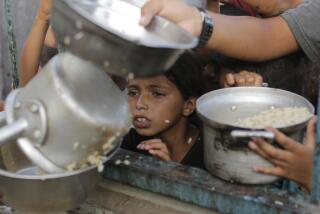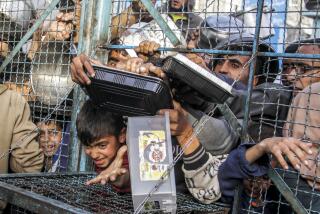U.N. Convoy Brings Bosnian Town Its First Relief Since April
- Share via
SREBRENICA, Bosnia-Herzegovina — A U.N. relief convoy Saturday brought the first outside help to the Muslim stronghold of Srebrenica since war erupted in Bosnia-Herzegovina in April.
It brought food and clothing to 70,000 people desperately trying to survive on corn, oats and potatoes in the ruins of the town.
“We didn’t dare to believe the Serbs would let you come here. Thank God,” said Sabra Hasanovic, 45. “I feed my family corn, but we have no electricity or running water. Winter is near. We’ll die. Please help us get out.”
Serbian forces have besieged the town for seven months. Armed Muslim defenders met the convoy across no man’s land on the outskirts of Srebrenica, nestled in the mountains nine miles away from the Bosnian-Serbian frontier.
Bosnian Serb commanders had blocked the convoy for three days, even after the Office of the U.N. High Commissioner for Refugees last week cut off aid to Serb-held territory in eastern Bosnia. The commanders said that the mined road was too dangerous for the 17 trucks carrying emergency aid.
Serbian villagers and soldiers from nearby Bratunac turned out to watch the convoy roll by. Some black-clad women, in mourning, threw flowers. Other armed men sat and jeered at the passing white U.N. vehicles. In contrast, raggedy children and women dressed in dimije , distinctive, baggy Turkish-style trousers, streamed down the surrounding hills to wave at the convoy. Many wept and screamed, “Congratulations!”
Abandoned homes and destroyed factories lined a one-mile strip between Serb- and Muslim-held territories.
The U.N. convoy swept into town after a Ukrainian armored personnel carrier bulldozed a barricade of burned-out buses and trucks. People crowded the roadside in the town, which has a normal population of 30,000, a figure local officials say has more than doubled with the influx of refugees from “ethnic cleansing” by Serbian forces in eastern Bosnia.
Refugees, who fled from fighting in nearby villages, tell harrowing tales of their journey to sanctuary in besieged Srebrenica.
“My father-in-law hanged himself when he saw the Serbs had set fire to his house. His wife dropped dead from the shock. Now I must take care of my two children,” Mera Kandjatorovic said.
“We fled together, spending the night in a trench. We prayed they wouldn’t find us,” Kandjatorovic said, tears streaming down her face.
Potatoes boiled on a wood-burning stove in the kitchen that four women and two children now call home. “We’ve covered the windows with plastic bags, but it will soon be cold,” Kandjatorovic said.
Everyone is living in overcrowded conditions in the buildings still habitable.
Stacks of wood piled in the houses throughout the town show that people are preparing for the harsh Balkan winter.
Women and children say they are terrified and hungry. The Muslim militiamen, dressed in a wide array of uniforms, appear in high spirits--vowing to defend the town.
“Over 1,000 Muslims were killed in Bratunac. I’m going to fight until we take it. Next time we’ll greet you by the river,” said Ibrahim Ademoic, one of the town’s defenders, referring to the Drina River that marks the Bosnian border with Serbia.
Bosnia’s Serbian forces now control 70% of Bosnian territory. Muslims, the republic’s largest ethnic group that made up 44% of the prewar 4.3 million population, are confined to a handful of Bosnian cities.
Yet Resup Naseroric, one of the local Muslim commanders, showed no hatred for his Serbian neighbors. “My Serbian friends will always be my friends. We are not fighting a jihad (holy) war, but the Serbian side is forcing us. We don’t want it to be a religious war because there are also people of Serbian nationality on our territory,” he said.
Ironically, Naseroric, 25, spent 4 1/2 years as a personal bodyguard to Slobodan Milosevic, the Serbian president who is seen by the international community as the chief instigator of violence in Bosnia.
The front-line commander, wearing a Rambo-style red bandanna, rallied able-bodied men with a megaphone to help the U.N. soldiers unload 130 tons of flour, beans and sugar into a warehouse. Other fighters cajoled Western journalists and peacekeepers into giving them cigarettes. Some of the militiamen were suspicious of the United Nations. A man, identifying himself only as Osman, appeared to be in charge. He repeatedly questioned whether all the food had actually been delivered, threatening to keep the trucks overnight.
Belgian drivers, French ambulance men and a British information officer were among those who took part in the humanitarian operation. The Ukrainians who provided a military escort for the convoy were particularly touched by the plight of two Russian women stranded in Srebrenica. “They must share our fate. We’re also hostages,” said Osman as the women looked on in tears. Despite pleas by the U.N. people, the women were not allowed to leave with the convoy.
Doctors at the local hospital expressed disappointment that medicines were not included in the relief supplies.
“We have nothing. No medicine, no gauze,” said Dr. Aziz Husic, who is one of five doctors currently caring for 70 wounded. A strong smell of blood and death permeated the two-story building. “We perform amputations without anesthetics, no pain killers.”
A U.N. spokesman said that medicine would be placed on the next convoy, which could arrive as soon as next week.
In the town center, most buildings were damaged, some having been burned to the ground by Serbian forces who held the town for five days in April. A young man pointed out three houses obliterated in an air raid. In one of the houses, burned by Serbian forces withdrawing from Srebrenica, the silhouettes of three people killed were sketched on an otherwise blackened carpet.
U.N. officials and soldiers expressed relief that the convoy had finally gotten through to the besieged town. “I’m very relieved. I hope this will be the first of many other similar actions and that we will be able to provide areas like Srebrenica with food and medicine,” convoy leader Laurens Jolles said.
Bosnian Serb commanders let the convoy pass, ending a four-day war of nerves with the U.N. forces. Local Serbian women previously had formed human walls to keep food from reaching Srebrenica. “Don’t feed our enemy,” they cried.
But Saturday, two girls dressed in colorful Serbian national costumes met the convoy when it crossed the bridge over the Drina into Bosnia and offered the traditional greeting of bread and salt.
“Welcome to the Serb land,” local leader Miroslav Deronjic told U.N. relief workers. “Every part of it is soaked with our blood. You have seen the anger and pain of our people.” But the Serbian commanders did not say whether they would soon permit another delivery of aid.
More to Read
Sign up for Essential California
The most important California stories and recommendations in your inbox every morning.
You may occasionally receive promotional content from the Los Angeles Times.










